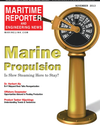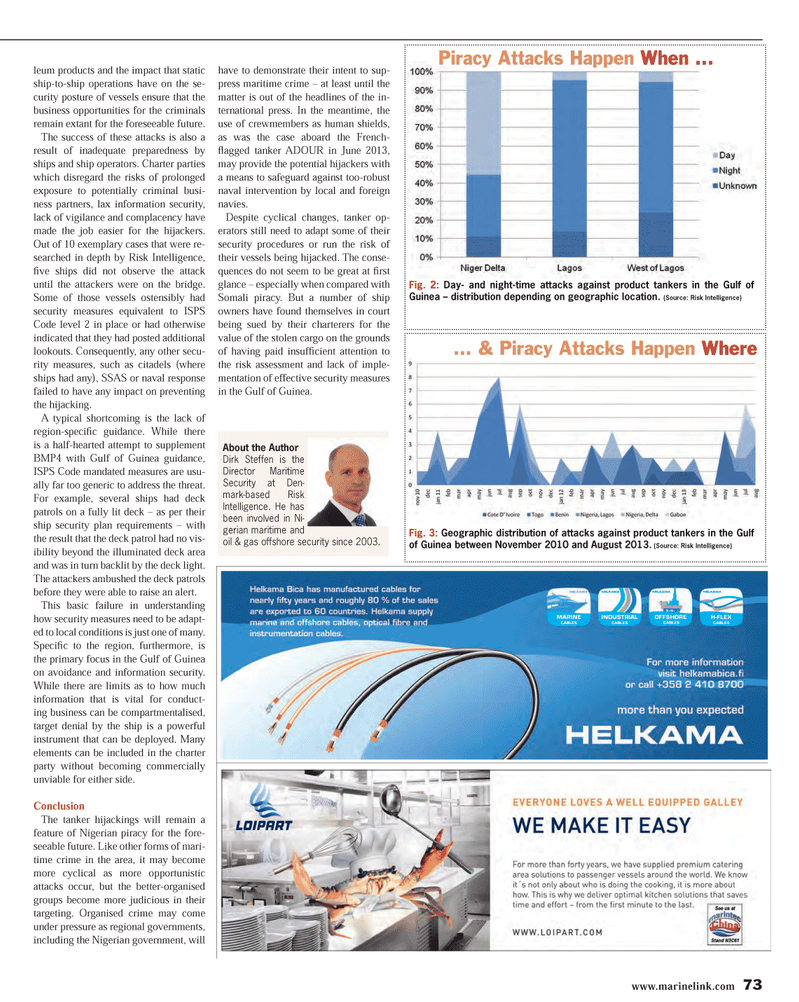
Page 73: of Maritime Reporter Magazine (November 2013)
Marine Propulsion Annual
Read this page in Pdf, Flash or Html5 edition of November 2013 Maritime Reporter Magazine
www.marinelink.com 73leum products and the impact that static ship-to-ship operations have on the se-curity posture of vessels ensure that the business opportunities for the criminals remain extant for the foreseeable future.The success of these attacks is also a result of inadequate preparedness by ships and ship operators. Charter parties which disregard the risks of prolonged exposure to potentially criminal busi-ness partners, lax information security, lack of vigilance and complacency have made the job easier for the hijackers. Out of 10 exemplary cases that were re-searched in depth by Risk Intelligence, Þ ve ships did not observe the attack until the attackers were on the bridge. Some of those vessels ostensibly had security measures equivalent to ISPS Code level 2 in place or had otherwise indicated that they had posted additional lookouts. Consequently, any other secu- rity measures, such as citadels (where ships had any), SSAS or naval response failed to have any impact on preventing the hijacking. A typical shortcoming is the lack of region-speciÞ c guidance. While there is a half-hearted attempt to supplement BMP4 with Gulf of Guinea guidance, ISPS Code mandated measures are usu-ally far too generic to address the threat. For example, several ships had deck patrols on a fully lit deck ? as per their ship security plan requirements ? with the result that the deck patrol had no vis-ibility beyond the illuminated deck area and was in turn backlit by the deck light. The attackers ambushed the deck patrols before they were able to raise an alert. This basic failure in understanding how security measures need to be adapt-ed to local conditions is just one of many. SpeciÞ c to the region, furthermore, is the primary focus in the Gulf of Guinea on avoidance and information security. While there are limits as to how much information that is vital for conduct-ing business can be compartmentalised, target denial by the ship is a powerful instrument that can be deployed. Many elements can be included in the charter party without becoming commercially unviable for either side.ConclusionThe tanker hijackings will remain a feature of Nigerian piracy for the fore-seeable future. Like other forms of mari-time crime in the area, it may become more cyclical as more opportunistic attacks occur, but the better-organised groups become more judicious in their targeting. Organised crime may come under pressure as regional governments, including the Nigerian government, will have to demonstrate their intent to sup-press maritime crime ? at least until the matter is out of the headlines of the in-ternational press. In the meantime, the use of crewmembers as human shields, as was the case aboard the French-ß agged tanker ADOUR in June 2013, may provide the potential hijackers with a means to safeguard against too-robust naval intervention by local and foreign navies.Despite cyclical changes, tanker op-erators still need to adapt some of their security procedures or run the risk of their vessels being hijacked. The conse- quences do not seem to be great at Þ rst glance ? especially when compared with Somali piracy. But a number of ship owners have found themselves in court being sued by their charterers for the value of the stolen cargo on the grounds of having paid insufÞ cient attention to the risk assessment and lack of imple-mentation of effective security measures in the Gulf of Guinea.Fig. 3: Geographic distribution of attacks against product tankers in the Gulf of Guinea between November 2010 and August 2013. (Source: Risk Intelligence) Fig. 2: Day- and night-time attacks against product tankers in the Gulf of Guinea ? distribution depending on geographic location. (Source: Risk Intelligence) ... & Piracy Attacks Happen Where Piracy Attacks Happen When ... About the AuthorDirk Steffen is the Director Maritime Security at Den-mark-based Risk Intelligence. He has been involved in Ni-gerian maritime and oil & gas offshore security since 2003. MR #11 (66-73).indd 73MR #11 (66-73).indd 7311/12/2013 10:45:23 AM11/12/2013 10:45:23 AM

 72
72

 74
74
